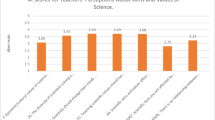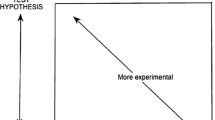Abstract
This paper addresses two methodological issues related to the assessment of teachers’ views of science. The first concerns the distinction between the “nature of science” (NOS) and the nature of “scientific inquiry” (SI): should the points related to NOS and those related to SI be analyzed independently? The second concerns the categorization of teachers’ views: is it relevant to analyze them according to a grid of predefined epistemological conceptions? Alternatively, does an empirical approach allow the emergence of epistemological profiles with an overall consistency? To investigate these issues, an empirical study has been performed based on a questionnaire on teachers’ views of science (called the “VOS questionnaire”) which has been submitted to 160 in-service primary teachers. With respect to the first issue, the analysis of the outcomes brings to light implicative relations between teachers’ views on NOS-type items and their views on SI-type items. This calls into question the alleged necessity of separating NOS and SI when assessing teachers’ epistemology. Concerning the second issue, a multiple correspondence analysis leads us to identify clusters of teachers with various levels of expertise concerning different epistemological points and without an overall consistency from the point of view of philosophy of science. This suggests that teachers’ consistency has to be found not in their view of science taken in isolation but considered in combination with other kinds of knowledge (e.g., pedagogical content knowledge) and their practices of science teaching.

Similar content being viewed by others
References
Abd-El-Khalick, F. (2001). Embedding nature of science instruction in preservice elementary science courses: abandoning scientism, but …. Journal of Science Teacher Education, 12(3), 215–233.
Akerson, V., & Volrich, M. (2006). Teaching nature of science explicitly in a first-grade internship setting. Journal of Research in Science Teaching, 43(4), 377–394.
Allchin, D. (2011). Evaluating knowledge of the nature of (whole) science. Science Education, 95(3), 518–542.
Anderson, D. (2015). The nature and influence of teacher beliefs and knowledge on the science teaching practice of three generalist New Zealand primary teachers. Research in Science Education, 45(3), 395–423.
Clough, M. (2011). Teaching and assessing the nature of science: how to effectively incorporate the nature of science in your classroom. The Science Teacher, 78(6), 56–60.
Cobern, W., & Loving, C. (2002). Investigation of pre-service elementary teachers’ thinking about science. Journal of Research in Science Teaching, 39(10), 1016–1031.
Gras, R., Briand, H., Peter, P., & Philippe, J. (1998). Implicative statistical analysis. In C. Hayashi, K. Yajima, H. Bock, N. Ohsumi, Y. Tanaka, & Y. Baba (Eds.), Data science, classification, and related methods: studies in classification, data analysis, and knowledge organization (pp. 412–419). Tokyo: Springer.
Greenacre, M., & Blasius, J. (2006). Multiple correspondence analysis and related methods. CRC Press.
Guerra-Ramos, M. (2012). Teachers’ ideas about the nature of science: a critical analysis of research approaches and their contribution to pedagogical practice. Science & Education, 21, 631–655.
Hodson, D. (2014). Nature of science in the science curriculum: origin, development, implications and shifting emphases. In M. Matthews (Ed.), International handbook of research in history, philosophy and science teaching (pp. 911–970). Berlin, Heidelberg: Springer.
Kang, S., Scharmann, L., & Noh, T. (2005). Examining students’ views on the nature of science: results from Korean 6th, 8th, and 10th graders. Science Education, 89(2), 314–334.
Kelly, G. (2014). Inquiry teaching and learning: philosophical considerations. In M. Matthews (Ed.), International handbook of research in history, philosophy and science teaching (pp. 1363–1380). Berlin: Springer.
Leden, L., & Hansson, L. (2019). Nature of science progression in school year 1-9: a case study of teachers’ suggestions and rationales. Research in Science Education, 49(2), 591–611.
Leden, L., Hansson, L., & Redfors, A. (2017). From black and white to shades of grey. Science & Education, 26(5), 483–511.
Lederman, N. (2007). Nature of science: past, present, and future. In S. Abell & N. Lederman (Eds.), Handbook of research on science education (pp. 831–879). Mahwah: Lawrence Erlbaum Associates.
Lederman, N., Abd-El-Khalick, F., Bell, R., & Schwartz, R. (2002). Views of nature of science questionnaire: toward valid and meaningful assessment of learners’ conceptions of nature of science. Journal of Research in Science Teaching, 39(6), 497–521.
Lederman, J., Lederman, N., Bartos, S., Bartels, S., Meyer, A., & Schwartz, R. (2014). Meaningful assessment of learners’ understandings about scientific inquiry: the views about scientific inquiry (VASI) questionnaire. Journal of Research in Science Teaching, 51(1), 65–83.
Matthews, M. (2012). Changing the focus: from nature of science (NOS) to features of science (FOS). In M. Khine (Ed.), Advances in nature of science research: concepts and methodologies (pp. 3–26). Dordrecht: Springer.
McComas, W. (1998). The principal elements of the nature of science: dispelling the myths. In W. McComas (Ed.), The nature of science in science education: rationales and strategies (pp. 41–52). Dordrecht: Kluwer.
National Research Council. (2012). A framework for K-12 science education: practices, crosscutting concepts, and core ideas. Washington: National Academy Press.
Neumann, I., Neumann, K., & Nehm, R. (2011). Evaluating instrument quality in science education: Rasch-based analyses of a nature of science test. International Journal of Science Education, 33(10), 1373–1405.
Nott, M., & Wellington, J. (1996). Probing teachers’ views of the nature of science: how should we do it and where should we be looking? In G. Welford, J. Osborne, & P. Scott (Eds.), Research in science education in Europe: current issues and themes (pp. 283–293). London: Falmer Press.
Park, D., & Lee, Y. (2009). Different conceptions of the nature of science among preservice elementary teachers of two countries. Journal of Elementary Science Education, 21(2), 1–14.
Shulman, L. S. (1986). Those who understand: knowledge growth in teaching. Educational Researcher, 15(2), 4–14.
Waters-Adams, S. (2006). The relationship between understanding of the nature of science and practice: the influence of teachers’ beliefs about education, teaching and learning. International Journal of Science Education, 28(8), 919–944.
Windschitl, M. (2004). Folk theories of “inquiry:” how pre-service teachers reproduce the discourse and practices of an atheoretical scientific method. Journal of Research in Science Teaching, 41(5), 481–512.
Acknowledgments
We would like to thank Luz Martinez and Karine Molvinger for their contribution to the design of the VOS questionnaire, as well as Suzanne Bellue and Kévin de Checchi for their work concerning the coding process.
Funding
This study received financial support from Agence Nationale de la Recherche (ANR, France)–Project FORMSCIENCES
Author information
Authors and Affiliations
Corresponding author
Ethics declarations
Conflict of Interest
The authors declare that they have no conflict of interest.
Additional information
Publisher’s Note
Springer Nature remains neutral with regard to jurisdictional claims in published maps and institutional affiliations.
Electronic supplementary material
Rights and permissions
About this article
Cite this article
Bächtold, M., Cross, D. & Munier, V. How to Assess and Categorize Teachers’ Views of Science? Two Methodological Issues. Res Sci Educ 51, 1423–1435 (2021). https://doi.org/10.1007/s11165-019-09904-x
Published:
Issue Date:
DOI: https://doi.org/10.1007/s11165-019-09904-x




